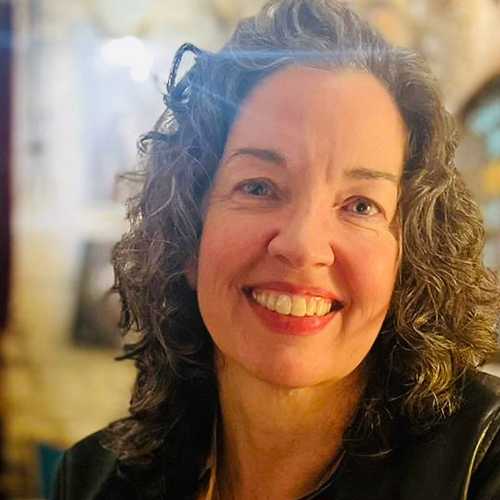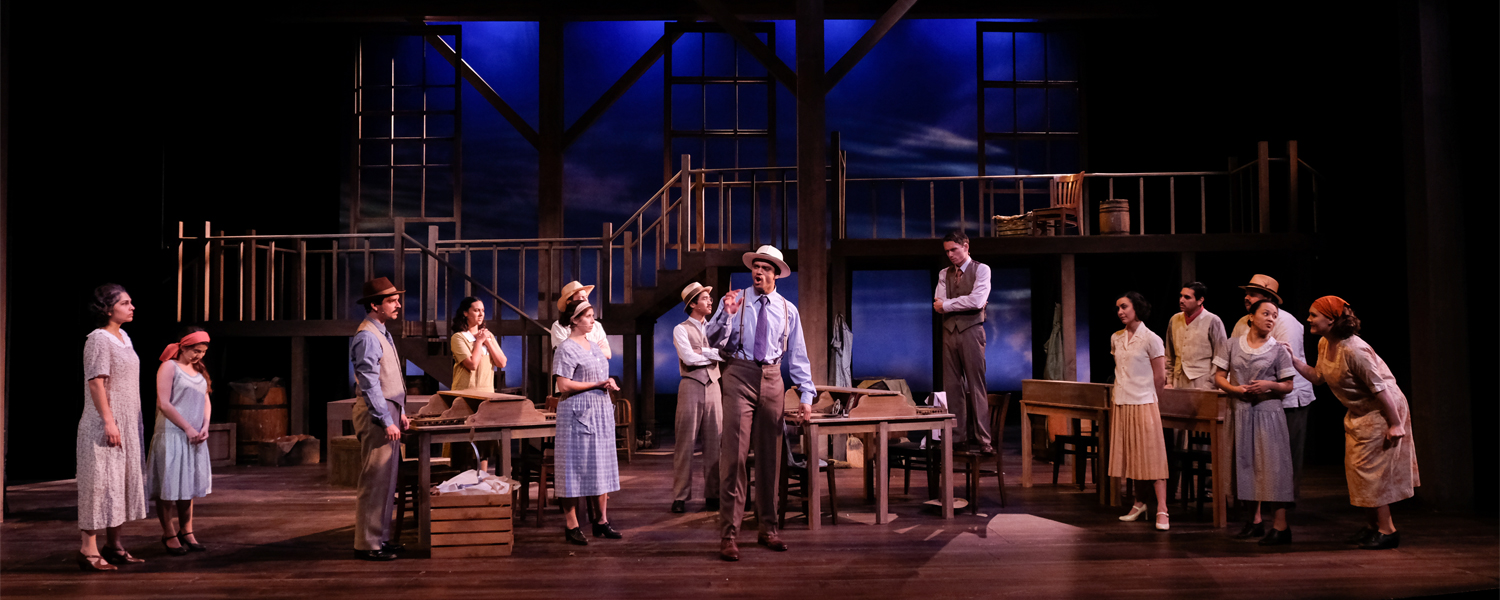
M.F.A. Film and Television Production
Note: The MFA in Film and Television Production accepts applications for admissions for the fall semester only.
The selection committee looks specifically for applicants with a unique and clear artistic voice, an interest in independent filmmaking, and the ability to collaborate. Familiarity with production techniques and technical skills are a benefit, but not required.
Deadlines
- Cal State Apply Application - February 1
- Submit Documents to Graduate Admissions - February 15
- Submit Supplemental Program Documents via Slate - March 1
Application Steps
- APPLY TO THE UNIVERSITY
- Apply to the university using CalState Apply.
- Within 72 hours, you will receive your SDSU Red ID and a unique link to Slate where you will submit your supplemental program documents.
- SUBMIT OFFICIAL TEST SCORES AND TRANSCRIPTS
- Official test scores and transcripts must be sent to Graduate Admissions. Details can be found on the Graduate Admissions website.
- SUBMIT SUPPLEMENTAL PROGRAM DOCUMENTS
- Using your unique link, submit your supplemental program documents via Slate.
- These materials must be received by March 1.
Supplemental Program Documents
- Personal Statement: A short (2-3 pages) essay (separate from the application form) detailing your creative and career goals, and how you think this program will benefit you.
- A resume to include any film and/or video production experience you have had.
- A story treatment for a short film, either narrative or documentary. This should not be for a blockbuster production, but rather to give us an idea of the kind of film you would like to make as a graduate student.
- Three letters of recommendation from academic and/or professional sources who can speak to your ability to achieve artistically and creatively in media production.
- Creative samples of your work. Film and video work that you have had a major role in are preferred (writer/director, cinematographer, editor, sound designer, production designer). Credits must be clearly indicated. Even though long work may be submitted, expect that about 10 minutes of the work provided will be viewed, so cue, or specify appropriate cueing, where necessary. Other creative samples might include a sample of original textual work (play, story, or screenplay for writers/directors) or visual material (drawings, storyboards, designs, or studio photography that may reflect lighting, framing, or composition skills).
NOTE FOR INTERNATIONAL STUDENTS: If you are an international student, there are several additional procedures you will need to complete, including:
- A Zoom interview (short list candidates only) to determine English skill level.
- Proof of English proficiency as outlined on the Graduate Admissions website.
- Providing proof of degree awarded in your first language.
- Completing a Financial Statement.
- The SDSU Graduate Admissions Office will evaluate your transcripts.
The SDSU website has a very clear checklist of the application procedure here: https://admissions.sdsu.
NOTE: The School of Theatre, Television, and Film requires a minimum grade point average of 3.0 (when A equals 4.0) in the last 60 semester (90 quarter) units attempted (this calculation may not include lower division courses taken after award of a baccalaureate degree).
Once the file is complete the School of Theatre, Television, and Film will make an admission recommendation to the Graduate Admissions Office, who will render final approval. If the recommendation is for admission, and the student has a deficient GPA, you will be accepted on a provisional basis. Graduate Admissions will send you official notification as to your admission or denial at a later date.
Information about all state, federal, and institutional aid programs is available from the Financial Aid Office. Call (619) 594-632 for more information.
Please note that the CalState Apply application deadline is February 1st. Ideally, all materials should be received by this date, but as is often the case, some items, test scores or recommendation letters trickle in a bit late. So, the absolute deadline by which all supplemental program materials must be received via Slate is March 1.
Inquiries about the program can be sent to:

It should be emphasized from the outset that the TFM Graduate Program stresses hands-on creative endeavor in the context of independent filmmaking. Ultimately, it is the student’s artistic achievement that will determine success in this program. All incoming TFM Graduate Students start in the fall semester with the same curriculum, and thus form a tightly knit group. The collaborative alliances students form in the first two semesters are very likely to extend through their graduate careers (and beyond) and strongly influence the success of their creative work in the program. These alliances are not necessarily limited to other graduate students; there are many talented and industrious undergraduates who support crew production.
Overview of the Curriculum
Your production work will be linked to the courses you take, with several independent or “Special Studies” courses available to you. Over the course of your graduate studies, you are required to take a total of 54 graduate units (18 3-unit courses), culminating with a directed thesis project (TFM 790). You may, of course, take more than 54 units, but only 54 will count towards your degree (you, with the advice of the Graduate Advisor, will designate which 54). Graduate courses are considered those with a 601 level catalogue number or higher. Courses with a 500 level number are advanced undergraduate courses. You will be allowed to take certain 500 level classes for graduate credit. This is an attractive option for most of our graduate students since many of these undergraduate classes offer valuable craft skill content. As you will learn, you can use various “clerical workarounds” to take additional lower division undergraduate courses (those with numbers below 500). Moreover, you are allowed to take up to six Special Studies courses (3 TFM 798 courses and 3 THEA 795 courses) for graduate credit (see “electives” below). Finally, you may take up to three courses in departments outside the School for Masters credit. As you can see, we offer an unusually flexible “elective-heavy” curriculum designed to support ongoing creative productivity.
To check the current course offerings, go to https://sunspot.sdsu.edu/schedule/search
Just select the appropriate calendar and click
on it. Under “Class Schedule” in the upper left corner of the page, click on the department you would like to see. (TFM or THEA, for example). To see our program listings, go to “TFM.”
Normally, TFM graduate students are expected to take 9-12 units per semester (3-4 classes) in order to graduate in three years. In their third year students may take only 6 units, in order to concentrate on their thesis project. TFM graduate students may extend beyond the expected three years in order to complete thesis projects. Although technically you are allowed up to six years to complete your program of study and your thesis project, going beyond a third year is strongly discouraged.
Degree Requirements:
Specific Requirements for the Master of Fine Arts Degree
Candidates for the Master of Fine Arts degree in film and television production must complete 54 units of coursework to include the following:
- Core preparation courses comprised of fifteen (15) units, Television, Film and New Media 601,610, 605, 625, and 670.
- Six (6) units of production electives selected from TFM 522,540,621,627, and 662.
- Nine (9) units of critical studies electives selected from TFM 530, 563, 571 and 573.
- Nine (9) units of Capstone Project Preparation. TFM 675 and 790.
- With approval of the graduate adviser, fifteen (15) additional graduate units in Television, Film and New Media, Theatre, and other departments.
- No more than nine (9) units of electives outside the School of Theatre, Television, and Film
Core Preparation
- TFM 601 - Business Aspects of Film, 3 units
- TFM 605 - Seminar: Production for Television and Film, 3 units
- TFM 610 - Seminar in Writing for Television and Film, 3 units
- TFM 625 - Seminar: Writing Short Narrative and Documentary Films, 3 units
- TFM 670 - Seminar: Midway Review Production, 3 units
Production Electives
Select 6 units from the following:
- TFM 522 - Advanced Film and Television Cinematography, 3 units
- TFM 540 - Documentary Production, 3 units
- TFM 621 - Sound Design for Film, 3 unit
- TFM 627 - Film Editing and Postproduction, 3 units
- TFM 662 - Scene-Based Film Production, 3 units
Critical Studies Requirement
Select 9 units from the following:
- TFM 530 - Selected Topics in Genre Studies for Television and Film, 3 units
- TFM 563 - Documentary: History and Theory, 3 unit
- TFM 571 - Selected Topics in Director Studies, 3 units
- TFM 573 - Selected Topics in History of Film, TV, and Media, 3 units
Capstone Experience Preparation
- TFM 675 - Seminar: Research and Bibliography in Media Production, 3 units
- TFM 790 - Portfolio/Examination Preparation, 6 units
Electives
Select 15 units from the following:
- TFM 522 - Advanced Film and Television Cinematography, 3 units
- TFM 550 - Art Direction for Television and Film, 3 units
- TFM 551 - Production Design for Television and Film, 3 units
- TFM 559 - Digital Design for Film and Stage, 3 units
- TFM 560 - Advanced Film, 3 units
- TFM 561 - Advanced Television, 3 units
- TFM 563 - Documentary: History and Theory, 3 units
- TFM 590 - Directing for Film and Television, 3 units
- TFM 596 - Selected Topics in Television, Film and New Media, 1-4 units
- TFM 621 - Sound Design for Film, 3 units
- TFM 627 - Film Editing and Postproduction, 3 units
- TFM 662 - Scene-Based Film Production, 3 units
- TFM 499 - Special Study, 3 units
- TFM 610 - Seminar in Design Aesthetics for Theatre, Television, and Film, 3 units
*May be repeated once for credit
+May be taken for a total of 9 credits
For additional curriculum details, please consult the following University Catalog.
For more information, contact the Academic Advisor:


